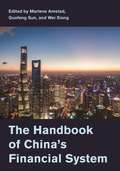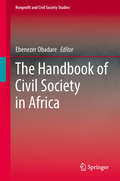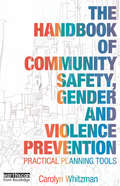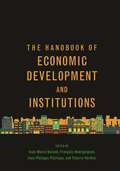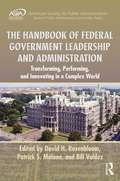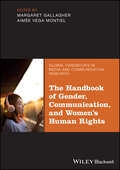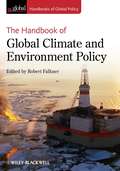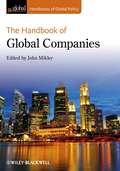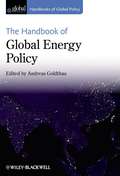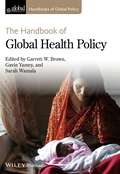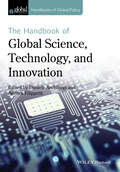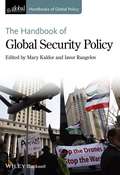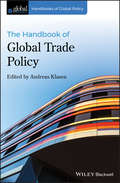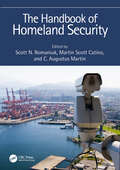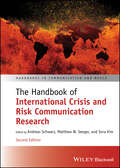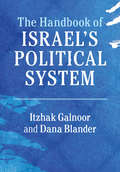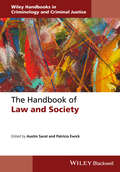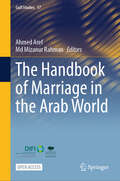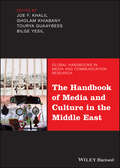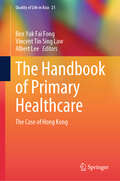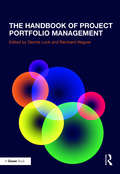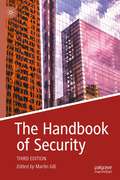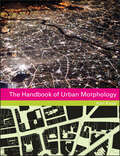- Table View
- List View
The Handbook of Child Life: A Guide for Pediatric Psychosocial Care
by Richard H. ThompsonIt has been said that the moral test of a society is how it treats its most vulnerable citizens. Those who enter the field of child life daily encounter those in our society who are among the most vulnerable . . . vulnerable because of their age and their ways of interpreting the world, vulnerable because of their physical circumstances, vulnerable because of the unfamiliar they encounter, vulnerable at times because of additional barriers such as language, poverty or prejudice. Yet, the child life specialist understands that each individual, despite the vulnerabilities he or she may bring to an encounter, also brings strength and resiliency. The task of the child life specialist is to build upon those strengths and to minimize individual vulnerability and maximize the growth of the individual. This book addresses the most important aspects of the practice of child life. The book is geared toward an audience beyond the introductory level and includes information on the state of the art in each chapter covered. Wherever possible, the book demonstrates application of the contents in practice through case studies. The goal of this text is to assist in this process, drawing upon the expertise of leading figures in the field to help provide child life specialists, and other allied health professionals, with the knowledge and skills they will need to accomplish this important task. Book jacket.
The Handbook of China's Financial System
by Wei Xiong Marlene Amstad Guofeng SunA comprehensive, in-depth, and authoritative guide to China's financial system The Chinese economy is one of the most important in the world, and its success is driven in large part by its financial system. Though closely scrutinized, this system is poorly understood and vastly different than those in the West. The Handbook of China’s Financial System will serve as a standard reference guide and invaluable resource to the workings of this critical institution.The handbook looks in depth at the central aspects of the system, including banking, bonds, the stock market, asset management, the pension system, and financial technology. Each chapter is written by leading experts in the field, and the contributors represent a unique mix of scholars and policymakers, many with firsthand knowledge of setting and carrying out Chinese financial policy. The first authoritative volume on China’s financial system, this handbook sheds new light on how it developed, how it works, and the prospects and direction of significant reforms to come.Contributors include Franklin Allen, Marlene Amstad, Kaiji Chen, Tuo Deng, Hanming Fang, Jin Feng, Tingting Ge, Kai Guo, Zhiguo He, Yiping Huang, Zhaojun Huang, Ningxin Jiang, Wenxi Jiang, Chang Liu, Jun Ma, Yanliang Mao, Fan Qi, Jun Qian, Chenyu Shan, Guofeng Sun, Xuan Tian, Chu Wang, Cong Wang, Tao Wang, Wei Xiong, Yi Xiong, Tao Zha, Bohui Zhang, Tianyu Zhang, Zhiwei Zhang, Ye Zhao, and Julie Lei Zhu.
The Handbook of Civil Society in Africa
by Ebenezer ObadareThis volume brings together the most up to date analyses of civil society in Africa from the best scholars and researchers working on the subject. Being the first of its kind, it casts a panoramic look at the African continent, drawing out persisting, if often under-communicated, variations in regional discourses. In a majority of notionally 'global' studies, Africa has received marginal attention, a marginality often highlighted by the usual token chapter. Filling a critical hiatus, theHandbook of Civil Society in Africa takes Africa, African developments, and African perspectives very seriously and worthy of academic interrogation in their own right. It offers a critical, clear-sighted perspective on civil society in Africa, and positions African discourses within the framework of important regional and global debates. It promises to be an invaluable reference work for researchers and practitioners working in the fields of civil society, nonprofit studies, development studies, volunteerism, civic service, and African studies. Endorsements: "This volume signposts a critical turning point in the renewed engagement with the theory and practice of civil society in Africa. Moving from traditional concerns with disquisitions on the appropriateness and possibility of the existence and vibrancy of the idea of civil society on the continent, the volume approaches the forms, contents, and features of the actually existing civil society in Africa from thematic, regional, and national angles. It demonstrates clearly the extent to which core intellectual work on civil society in Africa has largely moved from concerns with cultural reductionism to a nuanced examination of the complexities of (formal, non-formal, organizational, non-organizational, traditional, newer, usual, unusual) engagements, detailing the extent to which, over time, civil society as a concept has been indigenized, appropriated and adapted in the terrains of politics, society, economy, culture and new technologies on the continent. In all this, the book accomplishes the near-impossible. Without sacrificing the vigour, rigor and freshness of the often unpredictable fruits of up-to-date research into regional and national differences that crop up in the documentation of Africa's multiple realities and discourses, the volume weaves together a rich tapestry of the historical, theoretical and practical dimensions of an expanding civil society sector, and accompanying growth in popular discourse, advocacy, and academic literature, in such a diverse continent as Africa, into a meaningful whole of insightful themes. Written and edited by a very distinguished cross-continental and multi-disciplinary collection of researchers, research students, practitioners and activists, the volume provides cutting-edge evidence and makes a definitive case for a new lease of life for civil society research in Africa. " -Adigun Agbaje, Professor of Political Science, University of Ibadan, Nigeria. "Throughout Africa, forms of civic engagement and political participation have seen dynamic change in recent decades, yet conceptions of civil society have rarely accounted for this evolution. This volume is an essential source of new thinking about political association and collective action in Africa. The authors offer a wealth of analysis on changing organizations and social movements, new forms of interaction and communication, emerging strategies and issues, diverse social foundations, and the theoretical implications of a shifting associational landscape. The contributors provide an invaluable addition to the comparative literature on political change, democratic development, and social movements in Africa. " Peter Lewis, Johns Hopkins University School of Advanced international Studies
The Handbook of Community Safety Gender and Violence Prevention: Practical Planning Tools
by Carolyn WhitzmanViolence and insecurity are among the most important issues facing communities in the 21st century. Both family violence and community violence are rapidly rising in the urbanizing nations of theSouth and richer nations are also facing increased concern about the health, social, economic and environmental costs of violence and crime. The Handbook of Community Safety, Gender and Violence Prevention is the first book to gather together research and examples, from a gendered perspective, of local, regional and international interventions that work to prevent crime, violence and insecurity. Case studies of successful initiatives from every continent, in settings that vary from large cities to rural areas, are analysed to provide cross-cultural lessons of what works and what doesn t. The book presents essential practical advice to professionals such as: how to obtain diagnostic information on incidence and impacts of violence; how to develop, maintain and evaluate policies and programmes that can effectively promote community safety; and how to create trust and effectiveness in partnerships.
The Handbook of Conflict and Peace Communication (Global Handbooks in Media and Communication Research)
by Sudeshna RoyAn incisive collection of essays highlighting conflict and peace issues in the Global South, with coverage of theory, method, mediated, case-oriented, and innovative approaches In Handbook of Conflict and Peace Communication, renowned communication and media scholar Dr. Sudeshna Roy delivers an authoritative exploration of a variety of critical conflicts in the world and a spectrum of approaches to peace communication. This book offers an in-depth view of how intricate and intractable conflicts can be and how the communicative aspects of conflict are equally challenging. The author reviews and guides readers through classic and contemporary analysis in the field, providing a truly interdisciplinary work. Handbook of Conflict and Peace Communication is divided into five navigable sections—Theory Development, Method Development, Traditional/Digital Media and Peace and Conflict, Case Studies, and Innovative Approaches – that help illuminate workable and innovative peace communication strategies relevant to today’s conflicts. Readers will also find: Informative contributions from a collection of outstanding scholars, practitioners, and activists Comprehensive explorations of past conflict communication theory in the context of contemporary theory Practical tools to navigate complex local and global conflicts In-depth examinations of strategies of peace communication from the margins that acknowledge and elevate solutions for and from the most vulnerablePerfect for undergraduate and graduate students, scholars, and practitioners of peace and conflict studies, media studies, intercultural communication, human rights, and social justice, Handbook of Conflict and Peace Communication will also earn a place in the libraries of interdisciplinary studies involving philosophy, anthropology, political science, history, geography, economics, psychology, and others.
The Handbook of Economic Development and Institutions
by François Bourguignon Thierry Verdier Jean-Marie Baland Jean-Philippe PlatteauThe definitive reference on the most current economics of development and institutionsThe essential role that institutions play in understanding economic development has long been recognized across the social sciences, including in economics. Academic and policy interest in this subject has never been higher. The Handbook of Economic Development and Institutions is the first to bring together in one single volume the most cutting-edge work in this area by the best-known international economists. The volume’s editors, themselves leading scholars in the discipline, provide a comprehensive introduction, and the stellar contributors offer up-to-date analysis into institutional change and its interactions with the dynamics of economic development.This book focuses on three critical issues: the definitions of institutions in order to argue for a causal link to development, the complex interplay between formal and informal institutions, and the evolution and coevolution of institutions and their interactions with the political economy of development. Topics examined include the relationship between institutions and growth, educational systems, the role of the media, and the intersection between traditional systems of patronage and political institutions. Each chapter—covering the frontier research in its area and pointing to new areas of research—is the product of extensive workshopping on the part of the contributors.The definitive reference work on this topic, The Handbook of Economic Development and Institutions will be essential for academics, researchers, and professionals working in the field.
The Handbook of Federal Government Leadership and Administration: Transforming, Performing, and Innovating in a Complex World (ASPA Series in Public Administration and Public Policy)
by David H. Rosenbloom Patrick S. Malone Bill ValdezPublic management is context dependent, rather than generic. That may sound obvious, but in the late 1920s through the 1930s, a dominant strand of thought considered public administration to be a "single process," wherever practiced. Today by contrast, federal administration is distinguished from private enterprise, nonprofit management, and state and local governmental practices by the combined effects of its scope and scale; the constitutional separation of powers, federalism, and protection of individual rights; and administrative law requirements for stakeholder participation, representation, transparency, privacy, due process and other democratic-constitutional values. The Handbook of Federal Leadership and Administration is a state-of-the art guide to the unique features of federal administration, informed by the latest theoretical developments, research, and practical applications, and the leadership and management of federal agencies. Written by "pracademics" with federal practitioners specifically in mind, the handbook is designed to bridge the gap between academic and applied public administration by identifying what resonates with practitioners as they search for usable theories and research findings to improve performance. Combining rigor and relevance in the study and practice of federal administration, it includes chapters on theory, history, reform initiatives, leadership, necessary skill sets, budgeting, power and influence, political embeddedness, change management, separated and shared executive, legislative, and judicial powers, effective communication, ethics, and emerging concepts and challenges. It will be essential reading for federal practitioners, scholars, and "pracademics" alike.
The Handbook of Gender, Communication, and Women's Human Rights (Global Handbooks in Media and Communication Research)
by Margaret Gallagher Aimée Vega MontielA timely feminist intervention on gender, communication, and women’s human rights The Handbook on Gender, Communication, and Women's Human Rights engages contemporary debates on women’s rights, democracy, and neoliberalism through the lens of feminist communication scholarship. The first major collection of its kind published in the COVID-19 era, this unique volume frames a wide range of issues relevant to the gender and communication agenda within a human rights framework. An international panel of feminist academics and activists examines how media, information, and communication systems contribute to enabling, ignoring, questioning, or denying women's human and communication rights. Divided into four parts, the Handbook covers governance and policy, systems and institutions, advocacy and activism, and content, rights, and freedoms. Throughout the text, the contributors demonstrate the need for strong feminist critiques of exclusionary power structures, highlight new opportunities and challenges in promoting change, illustrate both the risks and rewards associated with digital communication, and much more. Offers a state-of-the-art exploration of the intersection between gender, communication, and women's rights Addresses both core and emerging topics in feminist media scholarship and research Discusses the vital role of communication systems and processes in women's struggles to claim and exercise their rights Analyzes how the COVID-19 pandemic has exacerbated structures of inequality and intensified the spread of disinformation Explores feminist-based concepts and approaches that could enrich communication policy at all levels Part of the Global Handbooks in Media and Communication Research series, TheHandbook of Gender, Communication, and Women's Human Rights is essential reading for advanced undergraduate and graduate students in media studies, communication studies, cultural studies, journalism, feminist studies, gender studies, global studies, and human rights programs at institutions around the world. It is also an invaluable resource for academics, researchers, policymakers, and civil society and human rights activists.
The Handbook of Global Climate and Environment Policy
by Robert FalknerThe Handbook of Global Climate and Environment Policy presents an authoritative and comprehensive overview of global policy on climate and the environment. It combines the strengths of an interdisciplinary team of experts from around the world to explore current debates and the latest thinking in the search for global environmental solutions.Explores the environmental challenges we currently face, and the concepts and approaches to solving theseQuestions the role of global actors, institutions and processes, and considers the links between global climate and environment policy, and that of the global economyHighlights the connections between social science research and global policyBrings together authoritative coverage of recent research by internationally-renowned experts from around the world, including from North America, Europe, and AsiaProvides an essential resource guide for students and researchers from across a wide range of related disciplines - from politics and international relations, to environmental sciences and sociology - and for global policy practitioners
The Handbook of Global Companies
by John MiklerThe Handbook of Global Companies brings together original research addressing the latest theories and empirical analysis surrounding the role of global companies in local, national, and international governance.Offers new insights into the role of global companies in relation to policy and governance at local, national, and international levelsBrings together newly-commissioned research by a global team of established and up-and-coming scholars from the fields of international relations, political science, public policy, and beyondConsiders the environmental and societal responsibilities of global corporations.Covers topics including the spatial locations of global companies; debate about the power they wield and their role as catalysts in new forms of governance; and the ways in which global companies share authority with the state and international organizations to drive policy processesSpeculates on the broader potential and limitations of global governance
The Handbook of Global Energy Policy
by Andreas GoldthauThis is the first handbook to provide a global policy perspective on energy, bringing together a diverse range of international energy issues in one volume.Maps the emerging field of global energy policy both for scholars and practitioners; the focus is on global issues, but it also explores the regional impact of international energy policiesAccounts for the multi-faceted nature of global energy policy challenges and broadens discussions of these beyond the prevalent debates about oil supplyAnalyzes global energy policy challenges across the dimensions of markets, development, sustainability, and security, and identifies key global policy challenges for the futureComprises newly-commissioned research by an international team of scholars and energy policy practitioners
The Handbook of Global Health Policy (Handbooks of Global Policy)
by Gavin Yamey Sarah Wamala Garrett W. BrownThe Handbook of Global Health Policy provides a definitive source of the key areas in the field. It examines the ethical and practical dimensions of new and current policy models and their effect on the future development of global health and policy. Maps out key debates and policy structures involved in all areas of global health policy Isolates and examines new policy initiatives in global health policy Provides an examination of these initiatives that captures both the ethical/critical as well as practical/empirical dimensions involved with global health policy, global health policy formation and its implications Confronts the theoretical and practical questions of ‘who gets what and why’ and ‘how, when and where?’ Captures the views of a wide array of scholars and practitioners, including from low- and middle-income countries, to ensure an inclusive view of current policy debates
The Handbook of Global Science, Technology, and Innovation (Handbooks of Global Policy)
by Daniele Archibugi Andrea FilippettiThis unique Handbook provides an in-depth overview of the themes and direction of science, technology, innovation, and public policy in an increasingly globalized world. Leading authorities discuss current debates, research issues, and prospects, and present a foundation for the development of global policy. Presents a state-of-the-art overview of science, technology, and innovation in the context of globalization and global policy Offers an accessible introduction for students, researchers, and policy makers in the fields of economics, sociology, political science, business studies, global studies, and international relations Addresses emerging issues and provides clear policy implications and analysis in each chapter Includes crucial coverage of the activities of established and emerging geographical areas Explores the ways in which reforms in intellectual property rights and world trade have been affected by the increasingly international flows of knowledge, technology, and innovation Examines major policy trends, including a significant shift toward private scientific research, and a heightened awareness amongst policy-makers of the economic and technological impact of scientific activity
The Handbook of Global Security Policy (Handbooks of Global Policy)
by Mary Kaldor Iavor RangelovThis Handbook brings together 30 state-of-the-art essays covering the essential aspects of global security research and practice for the 21st century. Embraces a broad definition of security that extends beyond the threat of foreign military attack to cover new risks for violence Offers comprehensive coverage framed around key security concepts, risks, policy tools, and global security actors Discusses pressing contemporary issues including terrorism, disarmament, genocide, sustainability, international peacekeeping, state-building, natural disasters, energy and food security, climate change, and cyber warfare Includes insightful and accessible contributions from around the world aimed at a broad base of scholars, students, practitioners, and policymakers
The Handbook of Global Trade Policy (Handbooks of Global Policy)
by Andreas KlasenProvides a state-of-the-art overview of international trade policy research The Handbook of Global Trade Policy offers readers a comprehensive resource for the study of international trade policy, governance, and financing. This timely and authoritative work presents contributions from a team of prominent experts that assess the policy implications of recent academic research on the subject. Discussions of contemporary research in fields such as economics, international business, international relations, law, and global politics help readers develop an expansive, interdisciplinary knowledge of 21st century foreign trade. Accessible for students, yet relevant for practitioners and researchers, this book expertly guides readers through essential literature in the field while highlighting new connections between social science research and global policy-making. Authoritative chapters address new realities of the global trade environment, global governance and international institutions, multilateral trade agreements, regional trade in developing countries, value chains in the Pacific Rim, and more. Designed to provide a well-rounded survey of the subject, this book covers financing trade such as export credit arrangements in developing economies, export insurance markets, climate finance, and recent initiatives of the World Trade Organization (WTO). This state-of-the-art overview: Integrates new data and up-to-date research in the field Offers an interdisciplinary approach to examining global trade policy Introduces fundamental concepts of global trade in an understandable style Combines contemporary economic, legal, financial, and policy topics Presents a wide range of perspectives on current issues surrounding trade practices and policies The Handbook of Global Trade Policy is a valuable resource for students, professionals, academics, researchers, and policy-makers in all areas of international trade, economics, business, and finance.
The Handbook of Homeland Security
by Scott N. Romaniuk Martin Scott Catino C. Augustus MartinThe Handbooks of Homeland Security Handbook is a convenient, one-stop reference and guide to the latest regulations and developments in all things relevant to the homeland security and defense domain. The book is divided into five parts and addresses such critical areas of as countering terrorism, critical infrastructure protection, information and cybersecurity, military and private sector support for Homeland Security, risk assessment, and preparedness for all-hazards and evolving threats. In total, more than 100 chapters outline the latest developments in homeland security policies, directives, and mandates as well as emergent threats and topical considerations for the Department of Homeland Security (DHS) and its stake-holders. The diverse array of chapter topics covered—contributed to by dozens of top experts in the field—provides a useful and important resource for any student, professional, researcher, policy-maker, or library in understanding the domestic initiatives of public-sector Homeland Security entities and their responsibilities in the current global environment.
The Handbook of International Crisis and Risk Communication Research (Handbooks in Communication and Media)
by Matthew W. Seeger Andreas Schwarz Sora KimGlobal Insights on Navigating Today’s Complex Crises Now in its second edition, The Handbook of International Crisis and Risk Communication Research offers a timely and comprehensive exploration of the methods, challenges, and innovations in managing present-day global crises and risks. Bringing together expert insights from across the fields of communication, public relations, and social sciences, this interdisciplinary volume examines crisis and risk communication through an international lens. Each chapter presents unique cultural, theoretical, and methodological perspectives for managing risk, mitigating crises, and fostering resilience. Amid growing transnational issues such as public health emergencies, climate-induced disasters, and political upheavals, the Handbook emphasizes the role of communication in crisis awareness, recovery, and renewal. Contributions by leading scholars and practitioners investigate vital issues such as the impact of misinformation, digital technologies, and media dynamics in shaping public perception and policy response. This revised and expanded edition also reflects recent global threats, including climate change, the COVID-19 pandemic, the war in Ukraine, and other cross-border crises. Equipping readers with the knowledge and frameworks necessary to navigate an increasingly complex and interconnected world, The Handbook of International Crisis and Risk Communication Research is perfect for advanced graduate courses and PhD programs in crisis and risk communication, as well as crisis managers, public relations consultants, communication officers, and scholars in risk management and communication.
The Handbook of Israel's Political System
by Itzhak Galnoor Dana BlanderThere is growing interest in Israel's political system from all parts of the world. This Handbook provides a unique comprehensive presentation of political life in Israel from the formative pre-state period to the present. The themes covered include: political heritage and the unresolved issues that have been left to fester; the institutional framework (the Knesset, government, judiciary, presidency, the state comptroller and commissions of inquiry); citizens' political participation (elections, political parties, civil society and the media); the four issues that have bedevilled Israeli democracy since its establishment (security, state and religion, the status of Israel's Arab citizens and economic inequities with concomitant social gaps); and the contours of the political culture and its impact on Israel's democracy. The authors skilfully integrate detailed basic data with an analysis of structures and processes, making the Handbook accessible to both experts and those with a general interest in Israel.
The Handbook of Law and Society (Wiley Handbooks in Criminology and Criminal Justice)
by Austin Sarat Patricia EwickBringing a timely synthesis to the field, The Handbook of Law and Society presents a comprehensive overview of key research findings, theoretical developments, and methodological controversies in the field of law and society. Provides illuminating insights into societal issues that pose ongoing real-world legal problems Offers accessible, succinct overviews with in-depth coverage of each topic, including its evolution, current state, and directions for future research Addresses a wide range of emergent topics in law and society and revisits perennial questions about law in a global world including the widening gap between codified laws and “law in action”, problems in the implementation of legal decisions, law’s constitutive role in shaping society, the importance of law in everyday life, ways legal institutions both embrace and resist change, the impact of new media and technologies on law, intersections of law and identity, law’s relationship to social consensus and conflict, and many more Features contributions from 38 international expert scholars working in diverse fields at the intersections of legal studies and social sciences Unique in its contributions to this rapidly expanding and important new multi-disciplinary field of study
The Handbook of Marriage in the Arab World (Gulf Studies #17)
by Md Mizanur Rahman Ahmed ArefThis open access handbook combines multiple theoretical and practical approaches for enabling a nuanced understanding of the phenomenon of marriage in the Arab world. Adopting a holistic, interdisciplinary approach, it provides a framework for the contextual and macro factors surrounding and affecting marriage in the Arab countries. It looks at the different types of marriage, whether traditional or new to the Arab world, and takes a detailed examination of the dialectic of marriage and age. It considers the dynamics surrounding delayed marriages, early marriages, celibacy, marriage costs, and age gaps between spouses. In addition, it examines marital relations vis-à-vis a diverse array of sub-topics, including marital and emotional satisfaction, and violence. It also looks at the relationship between work and marriage, and explores how ‘women’s work’ affects their family relationships and intimacy. Finally, it offers a rich analysis of two core marriage-related issues in the modern Arab world: migration and its positive/negative impacts on the institution of marriage, and marriage in the context of war and conflict, as present in several areas within the Arab region. A sociological magnum opus for social science students and researchers in areas of marriage studies, gender studies, family studies, the sociology of work, peace and conflict studies, human migration, and economics, it is also relevant to policymakers, politicians, social workers, and human rights and migration activists working in the Arab world and beyond.
The Handbook of Media and Culture in the Middle East (Global Handbooks in Media and Communication Research)
by Bilge Yesil Tourya Guaaybess Joe F. Khalil Gholam KhiabanyThe Handbook of Media and Culture in the Middle East The Handbook of Media and Culture in the Middle East is an invaluable resource for anyone seeking to understand the profound and complex changes shaping the 21st century. With trans-regional contributions from established and emerging scholars, this ground-breaking volume offers conceptual essays and in-depth chapters that present rich analyses grounded in historical and geopolitical contexts, as well as key theory and empirical research. Rather than viewing the Middle East as a monolithic culture, this Handbook examines the diverse and multi-local characteristics of the region’s knowledge production, dynamic media, and rich cultures. It addresses a wide range of topics, including the evolving mainstream and alternative media, competing histories in the region, and pressing socio-economic and media debates. Additionally, the Handbook explores the impact of regional and international politics on Middle Eastern cultures and media. Designed to serve as a foundation for the next era of research in the field, The Handbook of Media and Culture in the Middle East is essential reading for all academics, scholars, and media practitioners. Its comprehensive scope makes it an excellent primary or supplementary textbook for undergraduate or graduate courses in global studies, media and communication, journalism, anthropology, sociology, economics, political science, and history.
The Handbook of Primary Healthcare: The Case of Hong Kong (Quality of Life in Asia #21)
by Ben Yuk Fai Fong Vincent Tin Sing Law Albert LeeThis handbook adopts a transdisciplinary approach to primary healthcare, incorporating a wide scope of perspectives and case studies from Hong Kong in China. It consists of four sections that explore the foundations, practices, development aspects of primary healthcare and systems. The book also pays particular attention to the psychosocial and humanistic contexts of primary healthcare, exploring dimensions such as misinformation in the age of social media in health communication and aspects of resilience in primary healthcare. With contributions from scholars and practitioners in areas that include family medicine, psychology, nutrition, health policy, health education, dentistry, social work, as well as Chinese medicine, it is an expansive presentation of current knowledge on healthcare in the community setting. It is an indispensable reference for policymakers, researchers, advanced students, primary healthcare professionals, community health practitioners, and health managers and educators seeking to collate the practical and philosophical aspects of healthcare, in Hong Kong particularly, but also in Greater China and Asia more broadly. Beyond its relevance to the immediate medical community, it is also a valuable text for researchers in medical law, social sciences, quality of life studies, public policy, business administration, and information technology and health communication.
The Handbook of Project Portfolio Management
by Reinhard Wagner Dennis LockManaging large and complex organizations; balancing the needs of business-as-usual, new products and services and business change; assuring risk across everything the business does; these are all core requirements of modern business which are provided by the discipline of portfolio management. The Handbook of Project Portfolio Management is the definitive publication that introduces and describes in detail project portfolio management in today’s ever-changing world. The handbook contains the essential knowledge required for managing portfolios of business change with real-life examples that are being used by today’s organizations in various industries and environments. The team of expert contributors includes many of the most experienced and highly regarded international writers and practitioners from the global project portfolio management industry, selected to provide the reader with examples, knowledge and the skills required to manage portfolios in any organization. Dennis Lock and Reinhard Wagner’s definitive reference on project portfolio management explains: the context and role of the discipline; the practical processes, tools and techniques required for managing portfolios successfully; the capability required and how to develop it. The text also covers the recognized standards as well as emerging issues such as sustainability and environment. Collectively, this is a must-have guide from the leading commentators and practitioners on project portfolio management from across the world.
The Handbook of Security
by Martin GillThe substantially revised third edition of The Handbook of Security provides the most comprehensive analysis of scholarly security debates and issues to date. It reflects the developments in security technology, the convergence of the cyber and security worlds, and the fact that security management has become even more business focused. It covers newer topics like terrorism, violence, and cybercrime through various offence types such as commercial robbery and bribery. This handbook comprises mostly brand new chapters and a few thoroughly revised chapters, with discussions of the impact of the pandemic. It includes contributions from some of the world's leading scholars from an even broader geographic scale to critique the way security is provided and managed. It speaks to professionals working in security and students studying security-related courses.
The Handbook of Urban Morphology (The Urban Handbook series)
by Karl KropfConceived as a practical manual of morphological analysis, The Handbook of Urban Morphology focuses on the form, structure and evolution of human settlements – from villages to metropolitan regions. It is the first book in any language focused on specific, up-to-date ‘how-to’ guidance , with clear summaries of the central concepts, step-by-step instructions for carrying out the analysis, case studies illustrating specific applications and discussion of theoretical underpinnings tied to evidence from the field. Ideal for students as well as professionals and academics dealing with the built environment.

